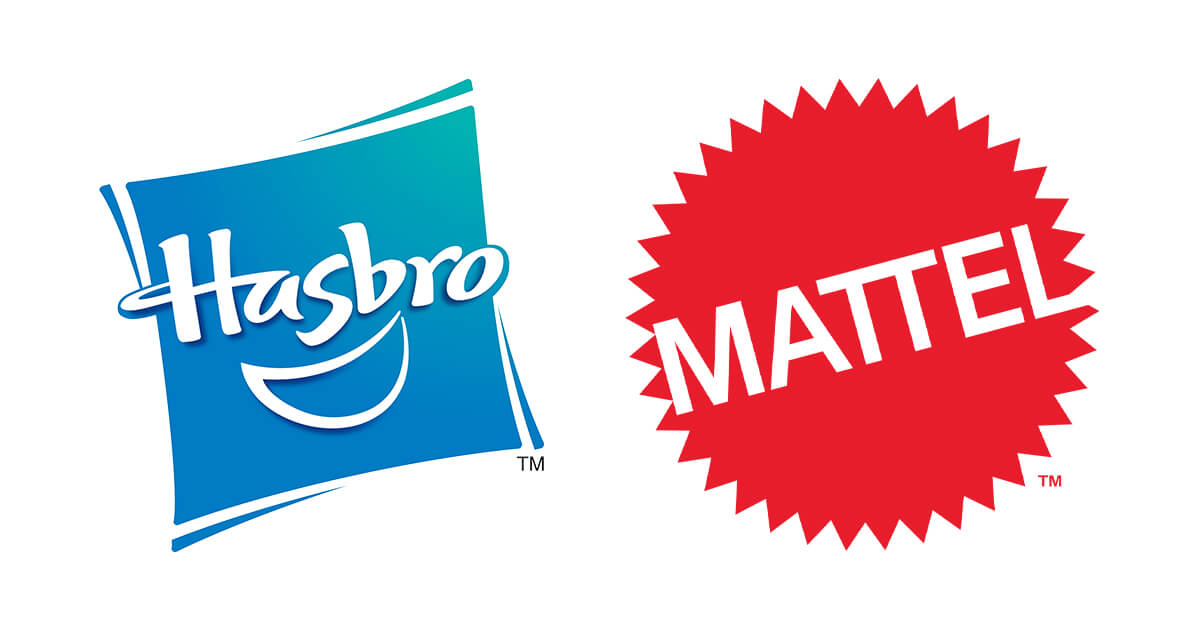Mattel and Hasbro Switch Up their Strategies

By: Mark Seavy
Hasbro and Mattel are forecasting a downturn in toy sales this year, executives said in releasing earnings. The decline is being driven by tight consumer spending, excess inventory, and a less robust slate of entertainment content.
Mattel is forecasting a “low-single digit” decline in global sales for 2024, while Hasbro is projecting a 7-12% decrease in consumer products. These projections come as the industry continues to struggle with excess inventory.
Hasbro took a $130-million write off on discontinued inventory in Q4. And while Hasbro and Mattel’s inventory levels declined in Q4, there remains “a lot of discounted merchandise at value resellers that will take a quarter or two to work through,” Hasbro CEO Chris Cocks said.
However, the bulk of that inventory is expected to clear by mid-year and the market will start to stabilize by fall, industry executives said. Overall, global toy sales will decline 5-7% in 2024, according to MGA Entertainment CEO Isaac Larian.
In the meantime, Hasbro and Mattel are switching up their strategies.
Hasbro is tempering its once expansive content plans—it weighed moving its headquarters to California at one point—by shifting to an “asset light and partner-lead” business, Cocks said. Hasbro recently closed the sale of Entertainment One (eOne) to Lionsgate, offloading a division that had been central to the company’s content plans when it was purchased in 2019.
The focus will be on core brands and digital technology, moving “low or negative profit” businesses to outbound licensing, Cocks said. For example, Hasbro will maintain its Furby toys but has also licensed the brand to Cakeworthy for a 13-piece apparel collection. And EZ Bake Oven, which Hasbro acquired in buying Kenner Corp. parent Tonka in 1991, will be added to outbound licensing.
In digital gaming, Hasbro’s Wizards of the Coast will be a major focus for outbound licensing. This will see the company build on strong revenue from licensees, including Larian Studio’s Dungeons & Dragons-based Baldur’s Gate 3 and Scopely’s Monopoly Go. Baldur’s Gate generated $90 million in licensing revenue for Hasbro in 2023, while revenue from Monopoly Go ran ahead of the minimum guarantee, Hasbro CFO Gina Goetter said.
And while a lack of major gaming releases planned for 2024 means Wizards of the Coast revenue is expected to decline 3-5%, Goetter said, an upcoming Baldur’s Gate release will be the first of several Dungeons & Dragons-related licensed titles planned for the next five to 10 years. Ultimately, the gaming brand is expected to generate $500 million in revenue through 2027, Cocks said.
Magic The Gathering, which releases six card sets annually (the majority of which generate $100 million in revenue each), will expand licensed co-brands. It’s pairing with Lord of the Rings posted more than $200 million in revenue in 2023. Additional sets are planned with the release of Microsoft’s Bethesda Game Studio’s Fallout on March 8 followed by Square Enix’s Final Fantasy and several Marvel collaborations in 2025, Cocks said.
The licensing business for casino and mobile games will take a step back in 2024 before growing sequentially every year thereafter, constantly adding new licenses to the mix, according to Cocks.
While Hasbro is sharpening its focus on core brands (including Bey Blade, Play Doh, Nerf, and others), Mattel is concentrating on content following the box office success of Warner Bros. Picture’s Barbie movie last year.
The blockbuster hit produced $150 million in revenue for Mattel, both from the toymaker’s cut of film revenue as well as revenue related to sales of toys and licensed products, Mattel’s CEO Ynon Kreiz said.
Moving forward, Mattel Films is developing its first animated film based on Bob the Builder and working with Paramount on a live-action American Girl movie. And Mattel Television Studios has premiered 12 series, including those for Barbie, Thomas & Friends, and Monster High. In mobile games, Mattel’s Mattel163 joint venture with Chinese developer NetEase posted $200 million in revenue in 2023, including gaming titles for UNO, Skip-Bo, and Phase 10.
“The breakout success of the award-winning Barbie movie was a showcase for our entertainment strategy and the cultural relevance of our brands outside the toy aisle,” Kreiz said. “Beyond 2024, we believe toy industry trends will further improve and that the industry will return to growth and continue to grow over the long-term.”




